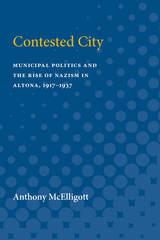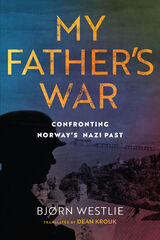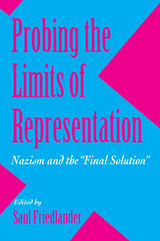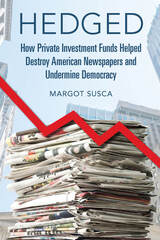
The first book to present an analysis of Arab response to fascism and Nazism from the perspectives of both individual countries and the Arab world at large, this collection problematizes and ultimately deconstructs the established narratives that assume most Arabs supported fascism and Nazism leading up to and during World War II. Using new source materials taken largely from Arab memoirs, archives, and print media, the articles reexamine Egyptian, Syrian, Lebanese, Palestinian, and Iraqi responses in the 1930s and throughout the war.
While acknowledging the individuals, forces, and organizations that did support and collaborate with Nazi Germany and fascist Italy, Arab Responses to Fascism and Nazism focuses on the many other Arab voices that identified with Britain and France and with the Allied cause during the war. The authors argue that many groups within Arab societies—elites and non-elites, governing forces, and civilians—rejected Nazism and fascism as totalitarian, racist, and, most important, as new, more oppressive forms of European imperialism. The essays in this volume argue that, in contrast to prevailing beliefs that Arabs were de facto supporters of Italy and Germany—since “the enemy of my enemy is my friend”—mainstream Arab forces and currents opposed the Axis powers and supported the Allies during the war. They played a significant role in the battles for control over the Middle East.


Tracing teachers' experiences in the Third Reich and East Germany, Charles Lansing analyzes developments in education of crucial importance to both dictatorships. Lansing uses the town of Brandenburg an der Havel as a case study to examine ideological reeducation projects requiring the full mobilization of the schools and the active participation of a transformed teaching staff. Although lesson plans were easily changed, skilled teachers were neither quickly made nor easily substituted. The men and women charged in the postwar era with educating a new “antifascist” generation were, to a surprising degree, the same individuals who had worked to “Nazify” pupils in the Third Reich. But significant discontinuities existed as well, especially regarding the teachers' professional self-understanding and attitudes toward the state-sanctioned teachers' union. The mixture of continuities and discontinuities helped to stabilize the early GDR as it faced its first major crisis in the uprising of June 17, 1953.
This uniquely comparative work sheds new light on an essential story as it reconceptualizes the traditional periodization of postwar German and European history.


With an insightful introduction from translator Dean Krouk, My Father’s War is a contemporary classic of war literature. Committed to genuine understanding without falling into undue sympathizing, this sober and reflective book presents an eye-opening, moving, intense, and necessary account of the allure of fascism in a world at war—and its personal costs.


Can the Holocaust be compellingly described or represented? Or is there some core aspect of the extermination of the Jews of Europe which resists our powers of depiction, of theory, of narrative? In this volume, twenty scholars probe the moral, epistemological, and aesthetic limits of an account or portrayal of the Nazi horror.
Christopher Browning, Hayden White, Carlo Ginzburg, Martin Jay, Dominick LaCapra, and others focus first on the general question: can the record of his historical event be established objectively through documents and witnesses, or is every historical interpretation informed by the perspective of its narrator? The suggestion that all historical accounts are determined by a preestablished narrative choice raises the ethical and intellectual issues of various forms of relativization. In more specific terms, what are the possibilities of historicizing National Socialism without minimizing the historical place of the Holocaust?
Also at issue are the problems related to an artistic representation, particularly the dilemmas posed by aestheticization. John Felstiner, Yael S. Feldman, Sidra Ezrahi, Eric Santner, and Anton Kaes grapple with these questions and confront the inadequacy of words in the face of the Holocaust. Others address the problem of fitting Nazi policies and atrocities into the history of Western thought and science. The book concludes with Geoffrey Hartman’s evocative meditation on memory.
These essays expose to scrutiny questions that have a pressing claim on our attention, our conscience, and our cultural memory. First presented at a conference organized by Saul Friedlander, they are now made available for the wide consideration and discussion they merit.

Vanguard of Nazism is the first full history of the German Free Corps and of its contributions to the rise of Nazism. This dramatic and horrifying story sheds new light on a dark corner of the recent past, and it has an unhappy relevance to neo-Nazist tendencies in Germany today.
The newly established Weimar Republic, defenseless against the Communists, hired groups of volunteer soldiers (the Free Corps) to fight for it. These volunteers—born of the pre–World War I youth movement, nourished on the battlefields of the War, unreconciled to defeat and determined to avenge it—fought for the Republic (which they despised) from Munich to Berlin, from Düsseldorf to the Baltic. When the Republic, in fear, tried to disband them, they went underground until they reappeared in the brown shirts of the Nazis.
The savage spirit, brutal acts, and perverted ideology of the men whom Hermann Goering called “the first soldiers of the Third Reich” stand out in glaring relief in this record. The book is based on contemporary newspaper accounts and government documents, but the story it tells would hardly be credible were it not for the memoirs of the Free Corps fighters themselves, from which Robert G. L. Waite quotes liberally. With this material, Waite is able to show that the Free Corps contributed to Hitler’s Germany powerful political shock troops, labor camps, a youth movement, a well-developed Führer concept, and the basic tenets of National Socialist ideology.
The movement, half a million strong, swept Germany at a time when Hitler was an unknown political agitator. But when Hitler came to power, leaders of the Free Corps emerged as leaders of the Third Reich. Waite lists the names of these men in a valuable appendix to the book, which shows the activities of each man in both movements.
Waite emphasizes and substantiates the thesis that National Socialism really began in the months and years immediately following World War I. Aside from its importance as history, the story of these self-styled Freebooters has all the ingredients of a fantastic adventure tale: intrigues, conspiracies, quick reversals, and sudden death follow each other in dramatic succession.
READERS
Browse our collection.
PUBLISHERS
See BiblioVault's publisher services.
STUDENT SERVICES
Files for college accessibility offices.
UChicago Accessibility Resources
home | accessibility | search | about | contact us
BiblioVault ® 2001 - 2024
The University of Chicago Press









